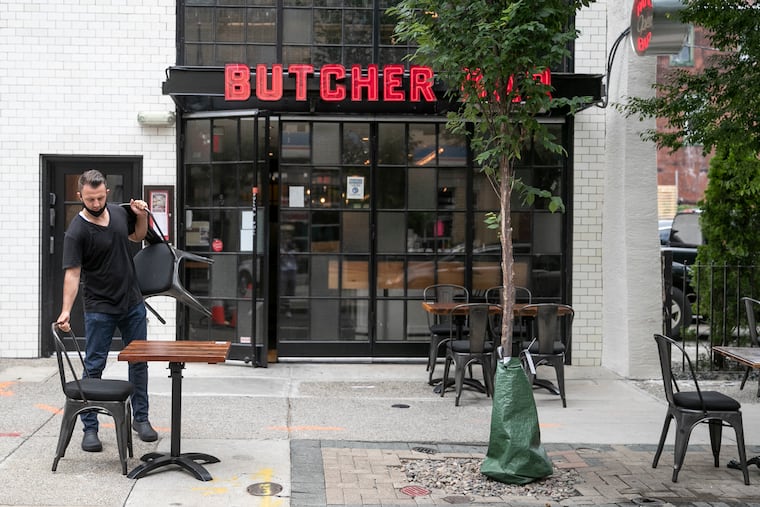Pa. says school reopenings could hinge on crowd limits at bars and eateries; Philly ‘unlikely’ to allow indoor dining Aug. 1 amid coronavirus upticks
The city had said Aug. 1 would be the earliest restaurants could allow indoor dining, but it looks like it will happen even later.

Saying that what happens in barrooms this summer could have consequences for classrooms in September, Pennsylvania Health Commissioner Rachel Levine defended the state’s decision to impose restrictions on eateries and taverns to stem the spread of the coronavirus.
And in Philadelphia, with coronavirus case numbers increasing, city Health Commissioner Thomas Farley said he isn’t sure when restaurants again will be able to serve inside.
City officials announced in June that Aug. 1 would be the earliest it would allow people to dine inside restaurants, even though Pennsylvania’s guidelines for the “green phase” of reopening would have allowed it to begin sooner. But Farley said Thursday that it’s likely the date would be pushed back even further.
Farley said the seven-day average for confirmed daily cases was 139, compared with 110 in the previous week.
For counties outside Philadelphia, the state last week imposed tougher restrictions on bars and eating establishments, and limited indoor gatherings to 25 people. Responding on Thursday to criticism, Levine suggested that the fate of the school year was at stake.
”Our goal right now is that school will reopen in person,” she said. “It’s critical to drive down the case counts now in terms of the rise of new cases.” If daily case counts don’t decline, she said, school reopenings could be “in jeopardy.”
Pennsylvania on Thursday reported 962 new confirmed COVID-19 cases, bringing the total to 104,359. Recent increases have been driven largely by surges in Western Pennsylvania, but case numbers also have crept upward in the Philadelphia region. Coronavirus-related deaths statewide have continued to flatten, with 16 added Thursday for a total of 7,079.
New Jersey on Thursday added 34 confirmed or “probable” virus-related fatalities, upping the statewide total to 15,370, the majority of those in North Jersey. Burlington, Camden, and Gloucester Counties have accounted for about 1,200 of the deaths, according to state figures.
The economic tolls are harder to assess, but this week Gov. Phil Murphy said the Garden State was weathering its worst fiscal crisis since “the Civil War” and “the Great Depression.”
On Thursday, he announced that the state would offer rental relief to small businesses hurt by the pandemic.
The relief would be funded by $6 million from federal relief funds and would allow eligible small businesses in 64 towns to apply for grants of up to $10,000 to help with lease payments.
One indication of the growing economic pain nationwide came Thursday from the Labor Department, which reported that the number of laid-off Americans seeking unemployment benefits rose last week for the first time since the pandemic struck in March.
The total of 1.4 million claims was about double what it was when the pandemic began in March. The $600 weekly federal aid payment for the jobless is set to expire at the end of this week.
The department estimated that 32 million people are receiving benefits, but that could include double-counting, and economists believe it is closer to 25 million.
Undoubtedly, many of those filing claims are restaurant workers. Several Philadelphia restaurants have been forced out of business, and those still open are operating with limited staffs.
» READ MORE: Why do Pennsylvania restaurants face tougher coronavirus restrictions?
As some business owners question whether the commonwealth could conclusively link upticks in cases to bars and restaurants, Levine said the commonwealth would consider releasing data regarding the correlation, which officials recognized in part due to contact tracing.
She would not say whether Pennsylvania would enforce restrictions on restaurants, including the requirement that they may serve alcohol only with the purchase of a meal.
She hoped, she said, Pennsylvanians would do the right thing. ”By trying to skirt the rules,” she said, “you’re not protecting the public health.”
She said if residents and business owners fail to take the new restrictions seriously, they could be jeopardizing students’ chances to return to classrooms in a few weeks.
But even as the Philadelphia School District makes plans to reopen classrooms to most children two days a week, it is anticipating that thousands will choose a fully virtual option.
» READ MORE: 2,000 Philly students have already opted for online-only learning and some schools could lose resources
In just one day Wednesday, the families of 2,000 students indicated they want to continue remote instruction when school begins Sept. 2. Eventually, officials said Thursday, they expect 20% of students will opt into the “Digital Academy.”
Schools with high concentrations of children in online instruction will see losses in resources, as teachers and support staff will be needed to serve the virtual learners, Superintendent William R. Hite Jr. said.
Addressing the city’s growing case numbers, Farley said that they have been increasing among the young, that 38% of those diagnosed recently were under 30, and better than 60% were under 40.
Farley stopped just short of saying the Aug. 1 restart date for indoor dining was out of the question, but said that in light of the numbers, “it looks unlikely.”
Levine said the state would be steadfast in insisting on its tavern and restaurant restrictions, invoking the Sunshine State, where officials ordered bars closed after cases surged.
“We are not going to be Florida,” she said. “I can guarantee you.”
Inquirer staff writers Kristen A. Graham, Justine McDaniel, and Rob Tornoe and the Associated Press contributed to this article.